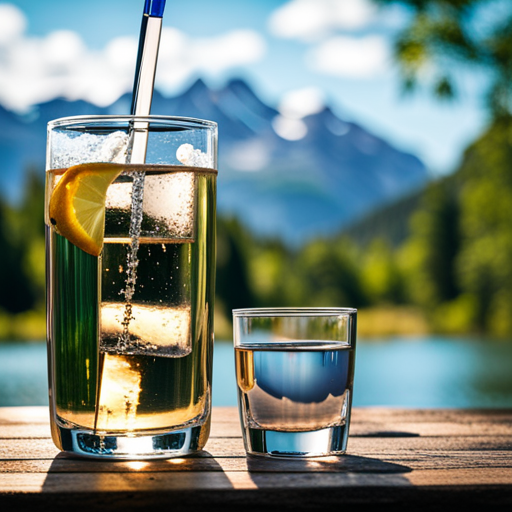Are you concerned about the quality of your drinking water? Have you heard about TDS and water softeners but are unsure about what they mean and how they relate to each other? If so, you’re not alone. Many homeowners are confused about the various factors that affect water quality and how to improve it.
This article aims to clear up some of that confusion and provide you with a better understanding of TDS and water softeners.
First, let’s define TDS. TDS stands for ‘total dissolved solids’and refers to the concentration of inorganic and organic substances in your water. These can include minerals, salts, metals, and other substances that can affect the taste, odor, and safety of your water.
Water softeners, on the other hand, are devices that work to remove minerals, such as calcium and magnesium, from your water. In the following paragraphs, we will explore the relationship between TDS and water softeners, the benefits of using a water softener, and whether or not they can help reduce TDS concentration in your water.
Key Takeaways
– TDS measures inorganic and organic substances in water and high levels can affect taste, odor, and safety of water. EPA sets maximum contaminant level of 500 ppm for drinking water.
– Water softeners remove minerals like calcium and magnesium, improve efficiency of appliances, and result in softer skin and hair. They also reduce soap and detergent usage and extend appliance lifespan.
– Other filtration methods like reverse osmosis, distillation, and deionization can reduce TDS levels and greatly improve the quality of household water.
– Investing in a water softener can provide long-term benefits for home and personal health, resulting in clean, clear, and refreshing water with minimal maintenance required.
Understanding TDS
You may already know that TDS measures all inorganic and organic materials in your water, but it’s important to understand how high levels can affect the taste and appearance of your drinking water.
TDS can be measured using several methods, such as conductivity or gravimetric analysis. In the United States, the Environmental Protection Agency (EPA) sets a maximum contaminant level of 500 ppm for TDS in drinking water.
However, some people prefer to have lower TDS levels for better tasting water. High TDS levels can cause water to taste salty, bitter, or metallic. It can also make water look cloudy or discolored.
If you notice these symptoms, it’s important to test your water for TDS levels. If your TDS levels are above the recommended standards, you may want to consider installing a reverse osmosis or distillation system to reduce TDS levels in your water.
Water Softener Benefits
Enjoy the benefits of a water softener, including improved efficiency of your appliances, less mineral buildup in your pipes, and softer skin and hair. Installing a water softener can be a cost-effective solution to hard water problems, as it reduces the amount of soap and detergent needed for cleaning, and extends the lifespan of water heaters, washing machines, and dishwashers. Moreover, a water softener requires minimal long term maintenance, as it only needs occasional refilling of salt and cleaning of the resin tank.
To further illustrate the benefits of a water softener, refer to the table below:
| Benefit | Explanation | Impact |
|---|---|---|
| Improved appliance efficiency | Softened water prevents mineral buildup in pipes and appliances | Saves energy and reduces repair costs |
| Softer skin and hair | Softened water is gentler on skin and hair | Improves personal hygiene and reduces use of hair and skin care products |
| Cost effectiveness | Water softeners reduce soap and detergent usage | Saves money on cleaning supplies and extends appliance lifespan |
| Long term maintenance | Water softeners require minimal maintenance | Saves time and money on repairs and replacements |
Investing in a water softener can provide long-term benefits for your home and personal health. Consider the cost-effectiveness and minimal maintenance required, and enjoy the luxury of softer water.
Reducing TDS in Water
To reduce the concentration of dissolved minerals and contaminants in your household water, options such as reverse osmosis, distillation, or deionization can be effective. These methods work by removing minerals and impurities from your water, resulting in a lower TDS concentration.
Reverse osmosis systems, for example, use a semipermeable membrane to filter out dissolved solids, while distillation boils water to remove minerals and impurities.
To determine if your water has a high TDS concentration, you can use TDS testing methods such as a handheld TDS meter or a water testing kit. If your TDS levels are found to be high, considering a reverse osmosis system or other filtration methods can greatly improve the quality of your household water.
With the right approach, you can enjoy clean, clear, and refreshing water that’s free from unwanted minerals and contaminants.
Conclusion
Congratulations, you now have a better understanding of TDS and water softeners! By learning about TDS, you now know that it stands for total dissolved solids and refers to the concentration of dissolved particles in water.
You also know that water softeners are beneficial for removing hard minerals from water, improving the taste and quality of your drinking water. Additionally, you now understand that while water softeners can reduce the concentration of certain minerals, they do not significantly impact TDS levels.
However, this doesn’t mean that water softeners aren’t worth investing in. They can still provide numerous benefits and improve the overall quality of your water. So, if you’re looking for an effective solution to improve the taste and quality of your water, a water softener may be the perfect solution for you.
